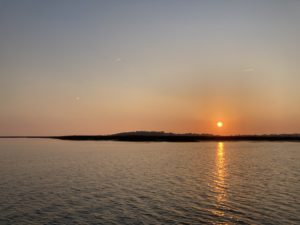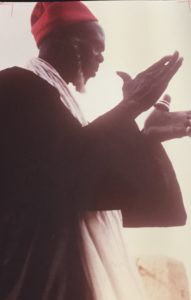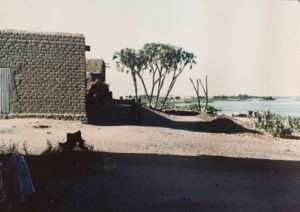
Early in 2022 I experienced a magnificent Bull River sunset near Savannah, Georgia. The Bull River flows through an intricate maze of breathtaking wetlands that snake their way toward the Georgia coast. If you are lucky enough to know someone with a boat, you can follow the current towards land’s end. You can see a dolphin or two, breathe in the salty scent of the ocean, and feel the coastal breeze and then. If your timing is good and the weather is clear, watch a fiery sun set beyond the low country horizon to the west. Reflecting about that sunset always makes me think about where I’ve been, and what the future holds.
When I think about my past, I am grateful for the moral compass my parents provided. I am also thankful for the rigorous scholarly training I received first in linguistics and then in social anthropology. I grew up in a working-class Jewish household. No one in my family, expected me to become professor a scholar. People in my family had little understanding of the social sciences and why they might be important. What’s more, they could not imagine why I would want to move far away to live and work in the remote regions of West Africa.
I am certainly not the first person to hear a chorus of familial doubt. Even so, I stood my ground and followed my passion. Indeed, I learned a great deal from mentors who took me under their care and taught me their ways. My teachers among the Songhay people of the Republic of Niger knew little about my ethnic background or my early life in the United States. They tended to categorize a man or woman like me as an anasara, a Christian, usually white. An anasara was usually an expatriate teacher, a European businessperson, a French official, a missionary or an American Peace Corps Volunteer. At first, the elders in Mehanna, the town where I first conducted anthropological research, wondered why an anasara would choose to live in the emotionally and physically demanding conditions found in rural Niger. In time these wise men and women began to think less about my “subject position” and more about my capacity to respect their practices, their ancestors, and their spirits.
“Without respect,” as Adamu Jenitongo, my principal Songhay mentor liked to remind me, “there is nothing.”

For more than 17 years, Adamu Jenitongo taught me about the mysteries of divination, spirit possession, herbal medicines, and sorcerous potions. He taught me about a way of life that has shaped who I became and how I understand the world. He discussed with the He taught me the relation of the village to the “bush.” He never tired of talking about the necessity for people to respect one another—no matter their station in life. Above all, he stressed the need for people to respect the power of the bush—of nature—to ensure the future of the village. “If people do not respect the power of the bush,” he liked to say, “the bush will consume the village. We are not masters of the bush. The bush is our master, and we need to demonstrate our respect for it.”
During our time together we would sit, gaze at the Niger River, and talk about life in the world. In the late afternoon, I would often take a dugout canoe, find a peaceful spot among the river reeds and rice paddies, and reflect on his lessons. His words have sustained me in these times of political, epidemiological, and environmental turbulence.
When I think about where I am today, I often wonder why Adamu Jenitongo entrusted me with so much Songhay knowledge—incantations, healing recipes, ritual formulae, and social philosophy. I do know that he wanted me to share with others what I learned from him. He wanted his words and his knowledge to be passed on, which is what I’ve tried to do through my teaching, articles, and books. At the 2022 Annual Meetings of the American Anthropological Association, David Signer, a Swiss journalist who was covering the academic convention for his newspaper, sought my opinion about the recent push to decolonize the social sciences, including, of course, anthropology. He wondered if my privileged subject position as an “anasara” made me feel uncomfortable about writing about West African esoteric practices. I have since reflected on his important questions, which compelled me to remember what Adamu Jenitongo thought about the nature of identity and the obligation to safeguard and share knowledge

“What matters is less about your origins,” my mentor once told me, “and more about what you become. You are not of my blood,” he once said to me, “but I can see who you are and feel I can trust you with the burden of knowledge.”
A part of that burden is making certain that the knowledge you attempt to convey is “correct.” If you made aware of an error of interpretation, which is unavoidable in the life and in scholarship, it is your obligation to set the record straight. Careful consideration about what you say and write demonstrates respect for past, the present and the future. Such care ensures that precious knowledge is passed on to the next generation. I will always be grateful to the mentors who took the time to pass on their knowledge to me. As I anticipate another boat ride on a beautiful river in 2023, I think about what I can still pass on, what is important in today’s world, and how I can continue to contribute to my family, friends, students, and discipline.
The arrival of a new year marks a time for us all to appreciate where we are and where we are going. Each of us, in our own way, is a custodian of knowledge. For me that means that I will continue to share knowledge that my West African mentors conveyed to me, hoping that it helps to empower the next generation of scholars to follow their own path with enhanced respect for nature and for one another.
#
Paul Stoller is a Permanent Fellow at the Center for Advanced Study, Friedrich Alexander University/Erlangen-Nuremberg, Germany. His current research focuses on continuity and change in the healing practices among West African immigrants in New York City. His forthcoming book, Wisdom from the Edge (Summer 2023) underscores the importance of recognizing how the application of indigenous wisdom can help to restore social and ecological harmony in an increasingly turbulent world.
__
Reposted from Psychology Today (January 02, 2023).
CAS-E blogs may be reprinted with the following acknowledgement: “This article was published by CAS-E on February 10, 2023.”
The views and opinions expressed in blog posts and comments made in response to the blog posts are those of the author(s) and do not necessarily reflect the views and opinions of CAS-E, its founders, its staff, or any agent or institution affiliated with it, nor those of the institution(s) with which the author is affiliated.
__
Image credits: © Paul Stoller.







